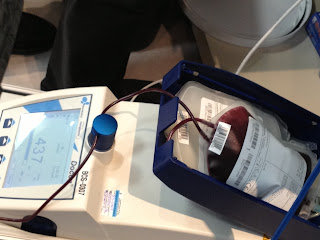Today we celebrate the 10th anniversary of World Blood Donor Day.
Let's start with some stats:
- 107 million blood donations are made every year.
- 65% of blood transfusions in low-income countries are given to children under the age of 5.
- In 2011, 71 countries reported collecting more than 90% of their blood supply from voluntary, unpaid blood donors, 60% of the countries collecting 100% of their blood supply from voluntary, unpaid blood donors. 73 countries were at 50% or less. By 2020, the W.H.O hopes for all countries to obtain 100% of their blood supply from voluntary, unpaid donors.
- A single blood donation from 1 person can save up to 3 lives.
You may have heard the popular slogan: "Give the gift of love: donate blood." World Blood Donor Day focuses on the value of the donated blood to the patient, not only in saving life, but also in helping people live longer and more productive lives.
So, what are you waiting for? Get out there and donate some blood! "It's in you to give"!
This was my last donation appointment - I'm not the biggest fan of needles, but it's such a great experience!
Today is also Family History Day, Flag Day, National Bourbon Day, Army Day, and Pause for the Pledge Day!
Here are some interesting things that happened on this day in history:
- Richard II of England met leaders of the Peasants' Revolt on Blackheath in 1381. The Tower of London was stormed by rebels, who entered without resistance.
- The US Army was founded in 1775.
- Finding Le Canadien to be a “libelous and seditious” publication, Governor Craig demoted Le Vasseur Borgia and other proprietors of the newspaper from their roles in the government in 1808.
- Charles Babbage proposed a difference engine in a paper to the Royal Astronomical Society entitled, "Note on the application of machinery to the computation of astronomical and mathematical tables" in 1822.
- Hardhat diving suit was patented by Leonard Norcross, of Dixfield, Maine in 1834. Also in 1834, sandpaper was patented by Isaac Fischer Jr. of Springfield, Vermont.
- The first session of the first Parliament of the United Canadas opened in Kingston, Canada West in 1841.
- Robert von Bunsen invented the Bunsen burner in 1847.
- Player piano was patented by John McTammany Jr. of Cambridge, Massachusetts in 1881.
- Massey Hall, which had been presented to Toronto by Hart Massey, opened in 1894.
- Architect Arthur Erickson, who was perhaps the first Canadian architect to be widely known by the international public, was born in Vancouver in 1924.
- Chlorophyll was patented by Benjamin Grushkin in 1938.
- Auschwitz concentration camp opened in 1940 - roughly 3 million innocent souls were killed there.
- Anne Frank began writing her diary in 1942.
- Ballet dancer Vanessa Harwood, admired for her virtuosity and her seductive stage presence, was born in Cheltenham, England in 1947.
- Elvis Presley graduated from LC Humes High School in Memphis Tennessee in 1953.
- The governor of the Bank of Canada, James Elliott Coyne, was forced to resign by the Diefenbaker government over fiscal and monetary policy disagreements in 1961.
- John Lennon's 2nd book, "A Spaniard in the Works" was published in 1965.
- A federal-provincial constitutional conference held in Victoria from June 14 - 16 of 1971 produced the Victoria Charter, an agreement on constitutional reform.
- Ronald Reagan was knighted by Queen Elizabeth II in 1989. Also in 1989, Zsa Zsa Gabor was arrested for slapping a Beverly Hills motorcycle patrolman.
- Canada and 25 nations signed a United Nations protocol in Oslo, Norway in 1994, on reducing sulphur emissions, a major cause of acid rain.
- The loss by the Vancouver Canucks in the 7th game of the Stanley Cup final in 1994 ignited one of the worst sports riots in Canadian history. More than 100 people were arrested and charged with various offences.
- In 1997, the Center for Disease Control in the US reported the first-ever decline in AIDS deaths since the outbreak of the epidemic, a reduction of 19% since the same period in 1996.
2012 - The world's first stem-cell assisted vein transplant was undertaken by Swedish doctors on a 10 year old girl in 2012. The operation was a success.
Stay tuned for our next, "On This Day in History"!








No comments:
Post a Comment